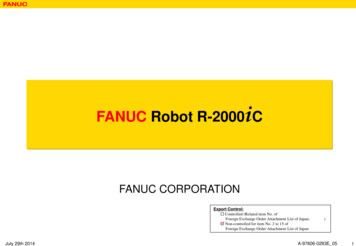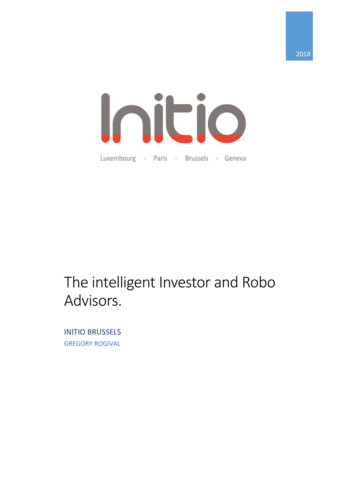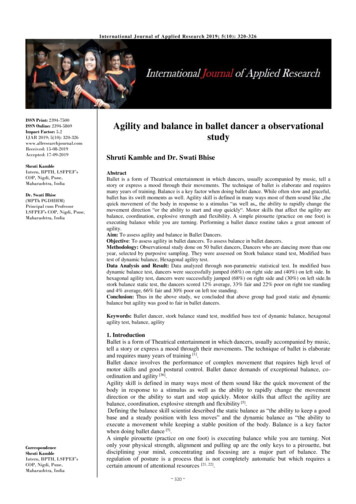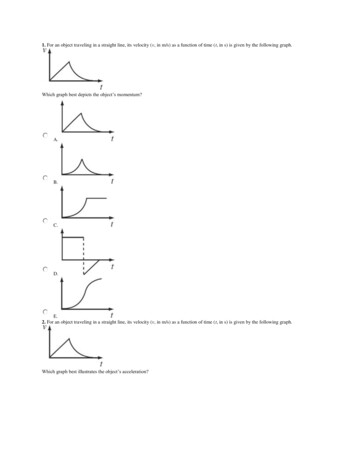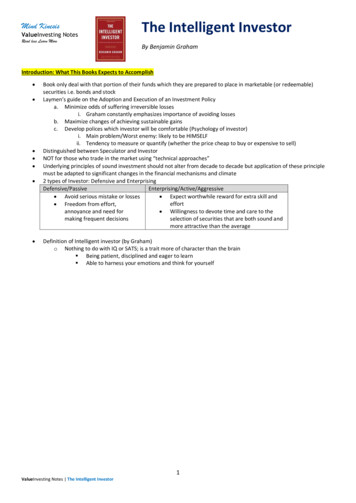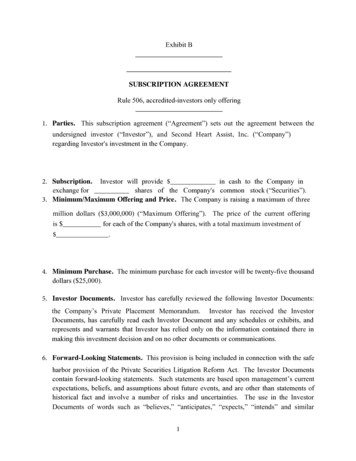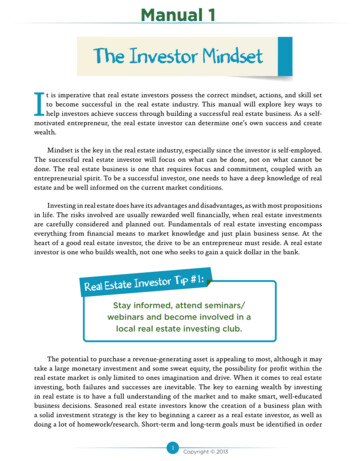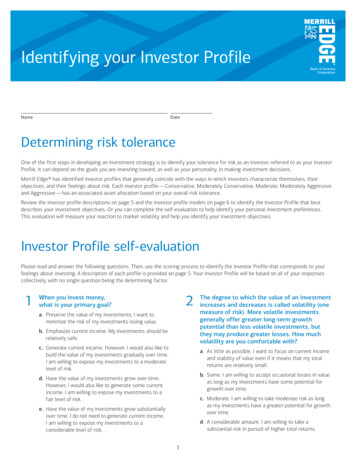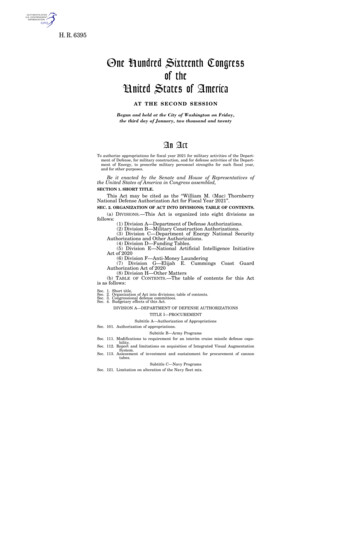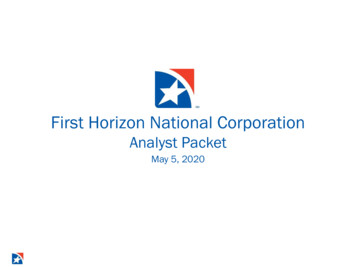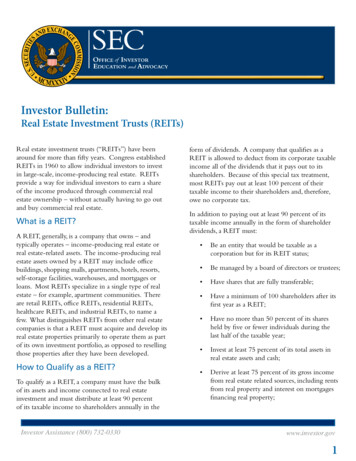
Transcription
Investor Bulletin:Real Estate Investment Trusts (REITs)Real estate investment trusts (“REITs”) have beenaround for more than fifty years. Congress establishedREITs in 1960 to allow individual investors to investin large-scale, income-producing real estate. REITsprovide a way for individual investors to earn a shareof the income produced through commercial realestate ownership – without actually having to go outand buy commercial real estate.What is a REIT?A REIT, generally, is a company that owns – andtypically operates – income-producing real estate orreal estate-related assets. The income-producing realestate assets owned by a REIT may include officebuildings, shopping malls, apartments, hotels, resorts,self-storage facilities, warehouses, and mortgages orloans. Most REITs specialize in a single type of realestate – for example, apartment communities. Thereare retail REITs, office REITs, residential REITs,healthcare REITs, and industrial REITs, to name afew. What distinguishes REITs from other real estatecompanies is that a REIT must acquire and develop itsreal estate properties primarily to operate them as partof its own investment portfolio, as opposed to resellingthose properties after they have been developed.How to Qualify as a REIT?To qualify as a REIT, a company must have the bulkof its assets and income connected to real estateinvestment and must distribute at least 90 percentof its taxable income to shareholders annually in theInvestor Assistance (800) 732-0330form of dividends. A company that qualifies as aREIT is allowed to deduct from its corporate taxableincome all of the dividends that it pays out to itsshareholders. Because of this special tax treatment,most REITs pay out at least 100 percent of theirtaxable income to their shareholders and, therefore,owe no corporate tax.In addition to paying out at least 90 percent of itstaxable income annually in the form of shareholderdividends, a REIT must: Be an entity that would be taxable as acorporation but for its REIT status; Be managed by a board of directors or trustees; Have shares that are fully transferable; Have a minimum of 100 shareholders after itsfirst year as a REIT; Have no more than 50 percent of its sharesheld by five or fewer individuals during thelast half of the taxable year; Invest at least 75 percent of its total assets inreal estate assets and cash; Derive at least 75 percent of its gross incomefrom real estate related sources, including rentsfrom real property and interest on mortgagesfinancing real property;www.investor.gov1
Derive at least 95 percent of its gross incomefrom such real estate sources and dividends orinterest from any source; and Have no more than 25 percent of its assetsconsist of non-qualifying securities or stock intaxable REIT subsidiaries.Three Categories of REITs: Equity,Mortgage, and HybridREITs generally fall into three categories: equityREITs, mortgage REITs, and hybrid REITs. MostREITs are equity REITs. Equity REITs typicallyown and operate income-producing real estate.Mortgage REITs, on the other hand, provide moneyto real estate owners and operators either directlyin the form of mortgages or other types of realestate loans, or indirectly through the acquisition ofmortgage-backed securities. Mortgage REITs tend tobe more leveraged (that is, they use a lot of borrowedcapital) than equity REITs. In addition, manymortgage REITs manage their interest rate and creditrisks through the use of derivatives and other hedgingtechniques. You should understand the risks of thesestrategies before deciding to invest in these types ofREITs. Hybrid REITs generally are companies thatuse the investment strategies of both equity REITsand mortgage REITs.OverviewLiquidityTransactionCostsPUBLICLY TRADED REITsREITs that file reports with theSEC and whose shares trade onnational stock exchanges.Shares are listed and traded,like any publicly traded stock,on major stock exchanges.Most are NYSE listed.Brokerage costs the same asfor buying or selling any otherpublicly traded stock.Investor Assistance (800) 732-0330ManagementTypically, the managers areBecause they often invest in debt securities securedby residential and commercial mortgages, mortgageREITs can be similar to certain investment companiesthat are focused on real estate. Generally, companiesthat invest a majority of their assets in real estate areexempted from the rules that govern investmentcompanies, such as mutual funds. The SEC hasinitiated a review to determine whether certainmortgage REITs should continue to be exempt frominvestment company regulation. Those rules generallylimit the amount of leverage that a fund can use andregulate the fees that can be charged to investors.Comparison of Publicly Traded REITsand Non-Traded REITsMany REITs (whether equity or mortgage) areregistered with the SEC and are publicly tradedon a stock exchange. These are known as publiclytraded REITs. In addition, there are REITs that areregistered with the SEC, but are not publicly traded.These are known as non-traded REITs (also knownas non-exchange traded REITs). The table belowcompares the characteristics of publicly traded andnon-traded REITs.NON-TRADED REITsREITs that file reports with the SEC butwhose shares do not trade on national stockexchanges.Shares are not traded on public stockexchanges. Redemption programs for sharesvary by company and are typically verylimited. Investors may have to wait toreceive a return of their capital until thecompany decides to engage in a transactionsuch as the listing of the shares on anexchange or a liquidation of the company’sassets.Typically, fees of 9 - 10 percent of theinvestment are charged for broker-dealercommissions and other upfront offering costs.Ongoing acquisition and management feesand other expenses also are typical. www.investor.govBackend fees may be charged.Typically, the company has no employees2
such as the listing of the shares on anexchange or a liquidation of the company’sassets.PUBLICLY TRADED REITsNON-TRADED REITsTransactionBrokeragethe sameasthe REITsTypically,9 - 10withpercentof theOverviewREITsthat costsfile reportswiththatfeesfile ofreportsthe SECbutCostsfor buyingor d whosesharestradeon investmentwhose sharesnot tradenational stockpubliclytradedexchanges.stock.commissions and other upfront offering costs.national stockexchanges.OngoingmanagementLiquidityShares are listed and traded,Shares areacquisitionnot tradedandon publicstock feesand other expensesalso aretypical.forBacklike any publicly traded stock,exchanges.Redemptionprogramssharesend feesmay be charged.on major stock exchanges.varyby companyand are typically veryManagementTypically,the managersTypically,Investorsthe companyhas noMostare NYSElisted. arelimited.may haveto employeeswait toemployees of the company.andismanagedbyathirdpartypursuantreceive a return of their capital untilthe to amanagementcontract.company decidesto engage in a transactionMinimumOne share.Typically,suchas the 1,000listing -of 2,500.the shares on anInvestmentexchange or a liquidation of the company’sAmountassets.IndependentStock exchangerequireNorth AmericanAdministratorsTransactionBrokeragecosts rulesthe sameas a Typically,fees ofSecurities9 - 10 percentof theDirectorsmajorityofordirectorsto beother Association(“NASAA”)whichCostsforbuyingselling anyinvestment arecharged forguidelines,broker-dealerindependentof management.havebeen adoptedby manystates,requireapublicly tradedstock.commissionsand otherupfrontofferingcosts.NYSE and NASDAQ rules call majoritydirectors andto bemanagementindependentfeesofOngoing ofacquisitionand other expensesalso guidelinesare typical.alsoBackfor fully independent audit,management.NASAAnominating, and compensation requireof each boardend feesthatmaya majoritybe charged.committees.committeeconsistof independentdirectors.ManagementTypically, the managers areTypically, thecompanyhas no employeesInvestorInvestors electdirectors.Investorselect directors.employeesof thecompany.andis managedby a third party pursuant to aControlmanagement contract.MinimumOneshare.Typically, 1,000CorporateSpecificstock exchange rulesSubject to stateand- 2,500.NASAA entAmountDisclosureRequired to make regular SEC Required to make regular SEC lyquarterlyfinancialAdministratorsreports andIndependentStockexchangerules requirea includingNorth AmericanSecuritiesfinancialreportsand yearlyyearlyauditedfinancial reports.Directorsmajority ofdirectorsto beAssociation(“NASAA”)guidelines, whichauditedfinancialreports.independent of management.have been adopted by many states, require aShare ValueReal-timepricesare call majorityNo independentinformationabout shareofNYSEandmarketNASDAQrulesof directorsto be valueavailable.Companymayprovidefor fully independent audit,management. NASAA guidelinesalso annominating,and compensationrequire thatsharea majorityof monthseach boardofanalyst reportsavailable toestimatedvalue 18after tclosed.of independent directors.InvestorInvestors elect directors.Investors elect directors.Source:ControlNational Association of Real Estate Investment1 Trusts (NAREIT)CorporateSpecific stock exchange rulesSubject to state and NASAA guidelines.Governanceon corporate governance.decides to engage in a transactionSome CaveatsNon-TradedREITsSEC RequiredcompanyDisclosure aboutRequiredto make regularto make regular SEC disclosures,as the financiallisting of reportsthe sharesObligationdisclosures, including quarterly includingsuchquarterlyandon an exchange Lack of Liquidity: Non-traded REITs areor a liquidationof the company’s assets. Thefinancial reports and yearlyyearly auditedfinancial reports.illiquid investments; they generally cannot betimingoftheseliquidityevents is at theaudited financial reports.soldreadilyontheopenmarket.Ifyouneedof the company,and may be morediscretionShare ValueReal-time market prices areNo independentinformationabout sharetoTransparencysell an asset to publicly available. Wide range value available. Company may provide anis made.may not be able to doso withreportsshares ofa non- toof analystavailableestimated share value 18 months after the Share Value Transparency: While thetraded REIT. Althoughnon-traded REITsthe public.offering has closed.market price of a publicly traded REITusually offer share redemption programs, theseis readily accessible, it can be difficult toare typically subject to significant limitations1determine the value of a share of a non-tradedand may be discontinued at the discretionREIT. Because non-traded REITs are notof the company. Investors may have to waittraded on an exchange there is no market priceto receive a return of their capital until theavailable. Non-traded REITs typically do notInvestor Assistance (800) 732-0330www.investor.gov3
provide an estimate of their value per shareuntil 18 months after their offering closes, butthis may be years after you have made yourinvestment. As a result, you may not be ableto assess the value of your non-traded REITinvestment for a significant time period andmay not be able to assess the volatility of yourinvestment. Significant Up-Front Fees: Non-tradedREITs are typically sold by financial advisers.Non-traded REITs generally have high upfrontfees that lower the value of the investmentby a significant amount. They usually chargesales commissions and upfront offering fees ofapproximately nine to 10 percent. Investorsshould understand that a portion of the sharepurchase price represents sales commissionsand that the amount actually invested in thecompany is reduced by these commissions.Distributions May Be Paid from OfferingProceeds and Borrowings: Investors maybe attracted to non-traded REITs by theirrelatively high dividend yields compared tothose of publicly traded REITs. However,investors should consider the total return of anon-traded REIT – capital appreciation plusdividends – instead of focusing exclusivelyon the high dividend yield. Unlike publiclytraded REITs, non-traded REITs frequentlypay distributions in excess of their funds fromoperations. To do so, they may use offeringproceeds and borrowings. This practice, whichis typically not used by publicly traded REITs,reduces the value of the shares and reducesthe cash available to the company to purchaseadditional assets. In considering an investmentin a non-traded REIT, you should assess theextent to which distributions have been paidfrom sources other than funds from operations.Conflicts of Interest: Non-traded REITsare typically externally managed—meaningthe REITs do not have their own employees.The external manager may be paid significantfees by the REIT for things that may notInvestor Assistance (800) 732-0330necessarily be aligned with the interestsof shareholders, such as fees based on theamount of property acquisitions and assetsunder management. In addition, the externalmanager may also manage other companiesthat may compete with the REIT.Investing in REITsAs with any investment, you should take into accountyour own financial situation, consult your financialadviser, and perform thorough research before makingany investment decisions concerning REITs. You canreview a REIT’s disclosure filings, including annualand quarterly reports and any offering prospectus atsec.gov. You can invest in a publicly traded REIT,which is listed on a major stock exchange, bypurchasing shares through a broker (as you wouldother publicly traded securities). Generally, you canpurchase the common stock, preferred stock, or debtsecurities of a publicly traded REIT. You can purchaseshares of a non-traded REIT through a broker thathas been engaged to participate in the non-tradedREIT’s offering. You can also purchase shares in aREIT mutual fund (either an index fund or activelymanaged fund) or REIT exchange-traded fund.Special Tax ConsiderationsThe shareholders of a REIT are responsible for payingtaxes on the dividends that they receive and on anycapital gains associated with their investment in theREIT. Dividends paid by REITs generally are treatedas ordinary income and are not entitled to the reducedtax rates on other types of corporate dividends. Forthis reason, some investors prefer to own shares of aREIT or REIT fund inside a tax-deferred account(such as a retirement account) in order to defer payingtaxes on the dividends received and any capital gainsincurred from that REIT until they start withdrawingmoney from the tax-deferred account. Finally, aREIT is not a pass-through entity. This means that,unlike a partnership, a REIT cannot pass any tax lossesthrough to its investors. Consider consulting your taxadviser before investing in REITs.www.investor.gov4
Related InformationSEC Division of Corporation Finance DisclosureGuidance: Topic No. 3—Staff Observations inthe Review of Promotional and Sales MaterialSubmitted Pursuant to Securities Act IndustryGuide 5SEC Concept Release: Companies Engaged in theBusiness of Acquiring Mortgages and MortgageRelated Instruments (September 7, 2011)FINRA Investor Alert: Public Non-TradedREITs—Perform a Careful Review before InvestingThe Office of Investor Education and Advocacy hasprovided this information as a service to investors. Itis neither a legal interpretation nor a statement ofSEC policy. If you have questions concerning themeaning or application of a particular law or rule,please consult with an attorney who specializes insecurities law.Investor Assistance (800) 732-0330December 20115
Real Estate Investment Trusts (REITs) Real estate investment trusts (“REITs”) have been around for more than fifty years. Congress established . REITs in 1960 to allow individual investors to invest in large-scale, income-producing real estate. REI
